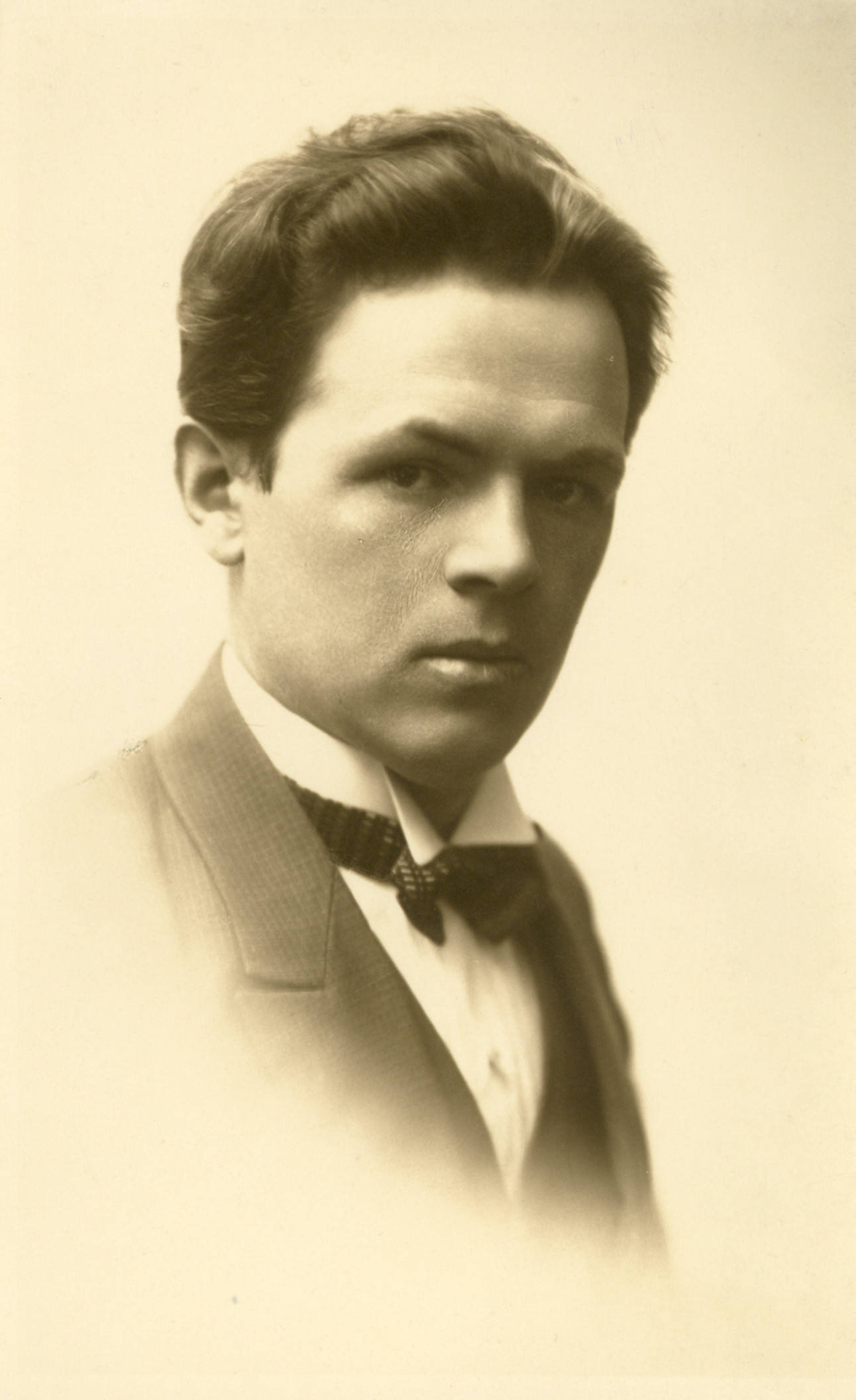
Peet Vallak
Peet Vallak (real name Peeter Pedajas, 23./11.VI 1893-17. III 1959) is mostly known as a writer of short stories, some of which are part of Estonian literary classics.
He was born in Voltveti parish, Pärnu county. He studied in Voltveti, Pärnu and in Tartu, took Kristjan Raud art courses (1913), attended the art school of St Petersburg Imperial Society for the Encouragement of the Arts (1913-1917, with breaks) and the Tartu Pallas Art School (1920-1922). During WWI, he worked as a journalist in Tallinn and Tartu. He fought in the Estonian War of Independence. After the war, he lived in Tartu. In 1929, he joined the group Kirjanduslik Orbiit, which strove towards a “true-to-life”, grassroots style of literary portrayal, in contrast to the Siuru group that was founded on elitist individualism. Juhan Sütiste, Erni Hiir, August Jakobson were among the members of the socialist-leaning Kirjanduslik Orbiit. Vallak became a member of the Estonian Writers’ Union in 1927 and in the 1930s, was also its board member. From 1938-1940, he worked as a dramaturge in Vanemuine. From 1940-1941, he worked as clerk at the organization bureau of the Soviet Estonian Writers’ Union. He was married to translator Marie Vasar (Marje Pedajas). At the beginning of the 1950s, he fell gravely ill and as a result, suffered from partial memory loss. He died in Tartu and is buried at Raadi-Maarja cemetery.
Vallak’s first works – prose, verse and drawings – were published already during his school years. In the 1920s, he published prose in magazines. His first book, the comedy Luupainajad (‘Nightmares’, 1924) was published under the pen name Egon Närep. The best of his early short stories were published in the collections Must rist (‘Black Cross’, 1925), Ajude mäss (‘Rebellion of Brains’, 1926) and Epp Pillarpardi Punjaba potitehas (‘Epp Pillarpart’s Punjaba Pot Factory’, 1925), the latter of which has been staged in theaters as well. In the 1930s, he was one of the most outstanding short story writers in Estonian literature. His story collections Omakohus (‘Kangaroo Court’, 1932), Neli tuult jalge all (‘Carried by Four Winds’, 1934), Teod pahurpidi (‘Inside Bout Acts’, 1935), Armuleib (‘Alms Bread’, 1936) and Lambavarga Näpsi lorijutte (‘The Fanciful Tales of Sheep Thief Näps’, 1938) with the fairy-tale like plot, also include mini-prose, for example the Estonian literary classic Maanaine (‘Country Woman’). The mysterious phrase “suur reheahi” (“large threshing barn oven”) from the punch line of ‘Country Woman’ has become a part of contemporary folklore in Estonia. After the war, he edited his stories into the selected collection Vilja mitmest salvest (‘Crops from Different Bins’, 3 volumes, 1945-1948).
Vallak’s stories concentrate on the characters, their relationships and on the oddities and weaknesses of the human character. His novels often depict strange happenings, include elements of the grotesque and his earlier works are dotted with expressionism. Most of his characters are poor men from the lower classes, such as various craftspeople (carpenters, blacksmiths), small town residents or villagers. His characters battle their destinies, they are usually failures. Some characters are weird, aggressive and unpredictable. Vallak uses the behaviorist method when portraying his characters: he observes them from the outside and does not delve on the internal. As a result, his characters often remain mysterious.
A. K. (Translated by A. S.)
Books in Estonian
Stories
Must rist. Novellid. Tartu: Noor-Eesti, 1925, 112 lk.
Epp Pillarbardi Punjaba potitehas. Jutustus. Tartu: Odamees/Carl Sarap, 1925, 107 lk. [2. trükk: 1936.]
Ajude mäss. Novellid. Tartu: Loodus, 1926, 159 lk.
Relvad vastamisi. Novellid. Tartu: Eesti Kirjanikkude Liit, 1929, 165 lk.
Omakohus. Jutustusi. Tartu: Eesti Kirjanikkude Liit, 1932, 176 lk.
Neli tuult jalge all. Novellid. Tartu: Eesti Kirjastuse Kooperatiiv, 1934, 175 lk.
Teod pahurpidi. Novellid. Tartu: Eesti Kirjastuse Kooperatiiv, 1935, 159 lk.
Armuleib. Novellid. Tartu: Eesti Kirjanikkude Liit, 1936, 246 lk.
Lambavarga Näpsi lorijutte. Valik novellete, satiire, humoreske, groteske. Tartu: Noor-Eesti, 1938, 197 lk.
Selected stories
Vilja mitmest salvest. 1. osa. Novellivalimik. Tallinn: Ilukirjandus ja Kunst, 1945, 236 lk.
Vilja mitmest salvest. 2. osa. Novellivalimik. Tallinn: Ilukirjandus ja Kunst, 1946, 318 lk.
Vilja mitmest salvest. 3. osa. Novellivalimik. Tallinn: Ilukirjandus ja Kunst, 1948, 270 lk.
Valitud novelle. Tallinn: Eesti Riiklik Kirjastus, 1955, 575 lk.
Valitud novelle. Tallinn: Eesti Riiklik Kirjastus, 1958, 574 lk.
Valitud novellid. 1. Stockholm: Vaba Eesti, 1959, 220 lk.
Tuuled ümber maja. Novellivalimik. Tallinn: Eesti Raamat, 1968, 432 lk.
Hinge taud. Novelle. Koostanud Enn Lillemets. Tallinn: Perioodika (Loomingu Raamatukogu), 1983, 88 lk.
Elu nullpunkt. Novellid. Koostanud Heino Puhvel. Tallinn: Eesti Raamat, 1985, 328 lk. [Sari ‘Eesti novellivara’.]
Plays
Egon Närep, Luupainajad. Komöödia 5 vaatuses. Tallinn: T. Mutsu, 1924, 113 lk.
Epp Pillarbardi Punjaba potitehas. Komöödia 3 vaatuses 5 pildis. Tallinn: Eesti Haridusliit, 1937, 118 lk.
Novels
Hulgus. Tartu: Noor-Eesti, 1927, 266 lk. [2. trükk: 2005.]
About Peet Vallak
Daniel Palgi, Peet Vallak. Elu ja looming. Tartu: Ilmamaa, 2011, 639 lk.



